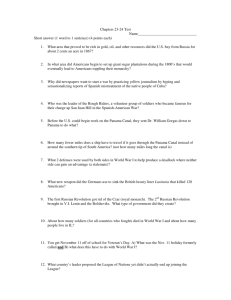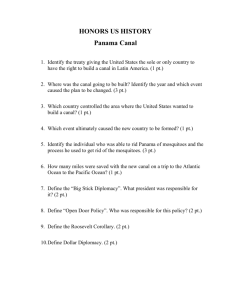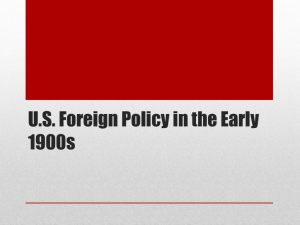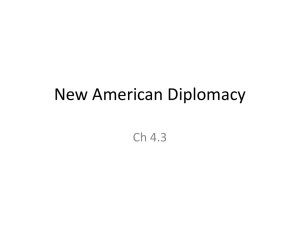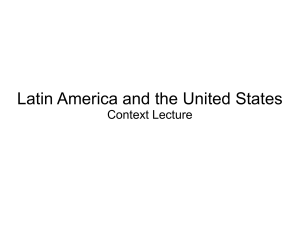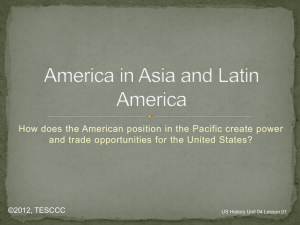10.3 The Panama Canal
advertisement
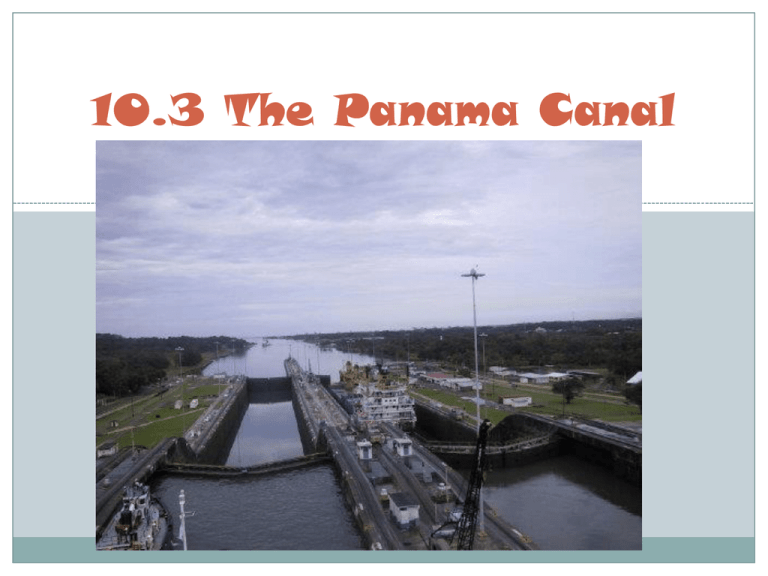
10.3 The Panama Canal Answer the questions using notes from the ppt. Who originally started building the canal? 2. Why did they fail? 2 reasons. 1. Panama Canal The building of the Panama Canal took 34 years from the initial effort in 1880 to actually opening the canal in 1914. The building of the canal is considered one of the greatest engineering feats in history. French Failure 1879 - the French buy land in Panama to build a canal Quickly run out of money and desire Many men die to tropical disease French sell the rights to the land to the US in 1901 for $40 million Columbia tells US they are not allowed to dig the canal 3. Why was it important to build the canal for North Americans? 4. What is an isthmus? The Panama Canal Both the United States and Europe wanted to build a canal across Central America This would save time and be less dangerous than going around Cape Horn in Chile Isthmus of Panama - the area known as Panama is 50 miles mile and was owned by Columbia Panama Canal Panama Canal isthmus a narrow strip of land connecting two larger land areas. Clayton- Bulwer Treaty Called for Britain and US to jointly build and maintain canal. Hay-Pauncefote Treaty Secretary of State John Hay Got Britain to surrender their interests in building Panama Canal IF U.S. let any vessel use canal 5. What country owned the land we know as Panama? Hay-Herran Treaty Columbia controls present day Panama. Thomas Herran Colombian minister made a treaty with Sec State John Hay. US would pay $10 million plus $250,000 a year for 99 years. Colombia rejects offer because they feel they can get a better deal 6. How did Teddy become President? 7. What did Teddy force people of Panama to do? Teddy Roosevelt Now president due to President McKinley's assassination Is furious he did not get permission for the canal by Columbia. He is determined to get what he wants. Philippe Bunau-Varilla He plots a revolt… Great idea Philippe Hey TR let’s start a revolt in Panama. the French man …tells TR that the people of Panama would like to become independent from Columbia TR likes the idea and the Panamanian revolt begins 11.2.1903 US warships head into Colon, Panama 11.4.1903 Panama declares itself independent America builds the canal!!!!! TR takes Action TR really wants a canal and isn’t bothered by the fact that Columbia won’t allow him to build it. TR supports a revolution by Panama to overthrow Columbia. US sends ships, men, and support. Panama is free - One day revolt ends with Panama’s independence Let’s Make a Deal US recognizes Panama as a country on 11/6/1903 US and Panama cut a deal - US leases land for 99 years for $10 million and $250,000 annually (Turned down by Columbia) US begins construction of a huge ditch through the country of Panama Panama Canal Facts Tolls for the canal are decided by the Panama Canal Authority and are based on vessel type, size, and the type of cargo carried Richard Halliburton Length of vessel 50ft More than 50 ft More than 80 ft More than 100 ft US$500 US$750 US$1,000 US$1,500 Best known today for having swum the length of the Panama Canal and paying the lowest toll in its history—thirty-six cent To sail from Atlantic to Pacific, ships navigated around Cape Horn, the treacherous southern extremity of South America. A New York to San Francisco journey measured some 13,000 miles and took months. 8. How was the Panama Canal made? The Canal The canal consists of artificial lakes, several improved and artificial channels, and three sets of locks. An additional artificial lake, Alajuela Lake (known during the American era as Madden Lake), acts as a reservoir for the canal 9. What tropical diseases were a problem during the construction of the Panama Canal? 10. List three ways you think would help combat these tropical diseases? Issues With Construction Had to help a rebellion in Columbia Malaria and Yellow Fever spread by mosquitoes 6000 lives lost 11. How were the problems with bugs solved? American builders faced difficult problems that threatened to derail the project such as tropical diseases like Malaria and Yellow Fever. Dr. William Gorgas, was hired to eradicate yellow fever , like he had in Havana years before. He was able to accomplish his goal by killing the mosquitoes that carried the diseases. Workers: 1. Drained swamps, swept drainage ditches, paved roads and installed plumbing. 2. Sprayed pesticides by the ton. 3. Entire towns rose from the jungle, complete with housing, schools, churches, commissaries, and social halls. Building the Panama Canal Construction Used France’s unfinished canal to start Locks built to go over mountains 51 miles long $375 million + $300 million of French At the Gatun Locks on the Atlantic side, workers poured enough concrete to build a wall 8' wide, 12' high, and 133 miles long. They built culverts the size of railroad tunnels to channel water from Gatun Lake into the locks. By August 15, 1914 the Panama Canal was officially opened by the passing of the SS Ancon. Panama Canal Figure 3: A map showing the route of the completed canal. A series of "locks" are used to control the water level within the canal. 1909 Lock Construction The American expenditures from 1904 to 1914 totaled $352,000,000, far more than the cost of anything built by the United States Government up to that time. In today’s money it would cost $7,448,028,707.72 Monroe Doctrine Stated that European powers were no longer to colonize or interfere with the affairs of the newly independent states of the Americas. The United States would not interfere with existing colonies or their dependencies in the Western Hemisphere. 13. What is the Roosevelt Corollary? Roosevelt Corollary Roosevelt's extension of the Monroe Doctrine asserted the right of the United States to intervene to stabilize the economic affairs of small nations in the Caribbean and Central America if they were unable to pay their international debts. Roosevelt Corollary Monroe Doctrine (1828) - US closes Latin America to new European colonies Roosevelt Corollary (1905) - US to serve as police in Latin America and intervene as necessary Anarchy Protection - TR thought US should get involved any time there is lawlessness in Western Hemisphere to aid the country and protect the US Foreign Policy of SPEAK SOFTLY AND CARRY A BIG STICK Theodore Roosevelt “I took the canal zone and let Congress debate, and while the debate goes on, the canal construction does also.” Theodore Roosevelt after being asked about how he feels that Congress does not support his decision to take the Canal Zone. Benefits of the Panama Canal Shorter Distance - former route was 12,600 miles. Now 4,900 miles Security - US Navy can get places quicker so it helps with protection of US and imperialism Information - US controls who travels through the canal Power - Sends a message of power and action of US to the world TR as the Top Cop of Western Hemisphere 1903 - Panama Canal 1905 - Takes over Dominican Republic’s finances after a revolution until they became stable 1906 - US sends troops to Cuba to halt a revolution (remember that we controlled Cuba with the Platt Amendment)
